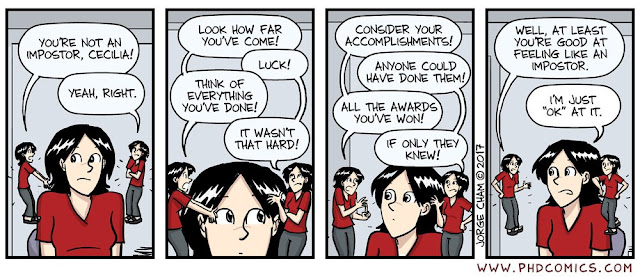Here are some of the simplest tests to check if you have the syndrome-
1) You think you don't know any/many things but have become good at pretending that you do.
2) Somebody said you don't deserve it and it stayed with you. 50 others said the opposite but you think they are just being nice or don't know anything.
3) You are reading this.
 |
| "Piled Higher and Deeper" by Jorge Cham www.phdcomics.com |
If it has been established that you are an imposter in your eyes, I have a few things to say.
1) Talk to your peers. Most often others are thinking the same thing but nobody has the courage to speak it out loud or discuss.
2) But keep in mind, nobody has been through what you have been through. Sure, everybody has had their own struggles but that doesn't make their or your struggle more or less difficult. Your thoughts can differ and thats okay.
3) Feelings can't be measured. Feelings are different for different people for different things. They can also be similar but don't try to find a way to normalise them.
4) You need to accept the advice you give others.
5) Reach out. To anyone or everyone. You might end up helping someone else when you were just looking for it yourself.
At the end of the day, it's okay to have imposter syndrome if its not affecting you strongly. Sometimes, it helps you to do better. But if its consuming your thoughts too much, ask for help. Especially for early career researchers, it would be great if mentors and supervisors could make sure the student is comfortable being themselves and can ask for help whenever needed, personally or professionally.
Shout out in the comments if you would like to read more such thoughts and blogs from researchers at different levels of their careers. Or if you'd like to ask or reach out for support.
Shivangi Sharan is a postdoctoral research associate at Imperial College London, working on prioritising the research that will be carried out using the JUICE magnetometer data. Previously, she has worked on the interior of Mars and Jupiter using their magnetic observations. She is an active member of the IAGA Blog Team and can be contacted via e-mail here.










0 comments:
Post a Comment